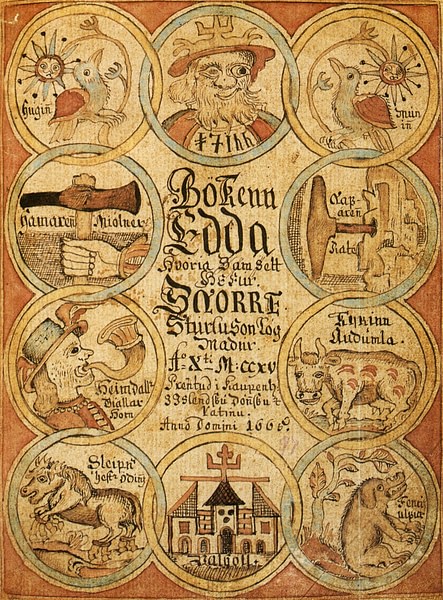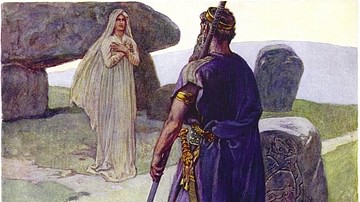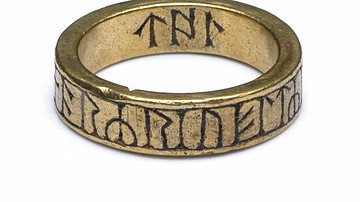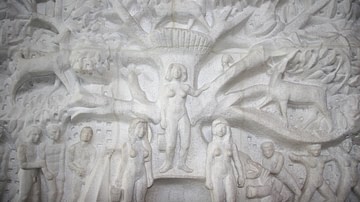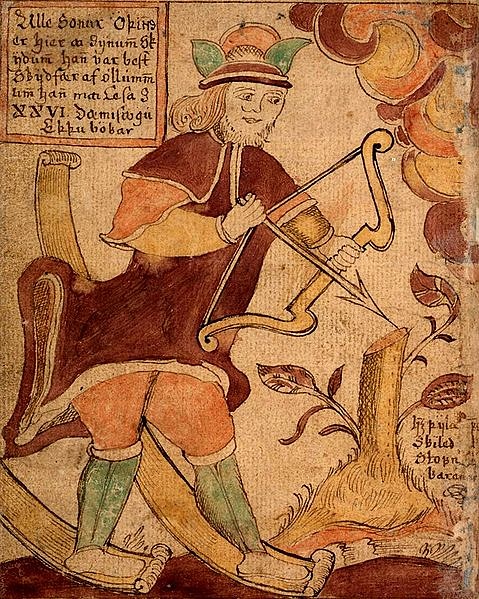
Ull (also known as Ullr), with his bow and skis, is such an elusive presence in Norse mythology that no conclusive remarks can be made about him. The 13th-century Icelandic author Snorri describes him only briefly in his Prose Edda, and he only appears in two of the Old Norse poems of the Poetic Edda. Danish historian Saxo Grammaticus (c. 1150 - c. 1220) recounts one story involving the character Ollerus, probably Ullr from Old Icelandic. While the scarcity of the literary sources suggests that the god had fallen into oblivion before the Northmen - Icelanders in particular - started writing about the heathen myths, place names from Sweden and Norway allow us to speculate that he once played a more prominent role in religious worship. There have been several interpretations of the god’s name, the most widely accepted links it to the Gothic wulþus, ("splendour" or "glory"), derived from Proto-Germanic wulþuz. Related words are found in Old English (wuldor – "fame"), Old Celtic (veleda – "seeress"), and Latin (vultus – "appearance").
Ull in the Poetic Edda
In Grímnismál (Lay of Grimnir), Ull is mentioned twice by name. The work tells the story of Odin in disguise going to king Geirröth to test his hospitality following a wager with his wife Frigg and ending up being tortured. During his torture, he describes various cosmic dwellings and inhabitants. Ull is mentioned second on a list of gods, after Thor, along with his residence, Ydalir, the yew dales: "they call it the yew dales / the place where Ull / has set a hall for himself / and Alfheim to Frey / the gods once gave / as a tooth-gift in ancient times" (Hildebrand, 129). The next god on the list - Freyr with his residence Alfheim, a divine gift - has led some authors to invoke a potential replacement of a sun cult related to Ull with a fertility one represented by the divine family of the Vanir. Similarly, the presence of Thor on top of the list could be interpreted as Thor dethroning Ull in the pantheon. Yet we cannot be certain that the list provided in the poem is one in order of importance.
To make things more complicated, the next strophe mentions the next hall Valascialf as the third one, not the fourth one, after Thor’s Thrudheim, Ull's Ydalir, and Freyr’s Alfheim. Did the scribe wish to suggest the identification of Ull and Freyr? Were they perhaps worshipped on similar sites? A more profane explanation would simply be an editing error for the two manuscripts, possibly based on the same older manuscript.
In strophe 42, Ull is elevated above the other gods, at least according to the phrasing. If we do not conceive his name as a mere good fit for the rhyme, his blessing seems to be more vital than any other figure’s, in the words of Odin/Grimnir himself. This could be taken as an indicator of the age of the poem, retaining the memory of a cult where Ull would have been primaeval. Yet once more we are faced with the problem of source scarcity, as nowhere else in the literary tradition is Ull presented in such high terms. On the other hand, the strophe could be related to Ull’s attribute of law and justice, hinted at in the other poem mentioning him. Odin finds himself in a troublesome position at the time, appreciating anyone who would remove the flames around him as being worthy of Ull’s favour.
The strophe might also hint at a connection to the open skies where Agnar, the son of the king who trapped Odin, takes down the kettle and exposes Odin to an open roof. The explanation has been broadened towards an association with the sun itself. The strophe continues on the mysterious note, by stating that the helper (humans?) would gain the grace of Ull. It would seem that this is acquired by exposing Odin to the open sky. We can only speculate on the relationship of this elusive expression to the idea of old Germanic gods being worshipped outdoors.
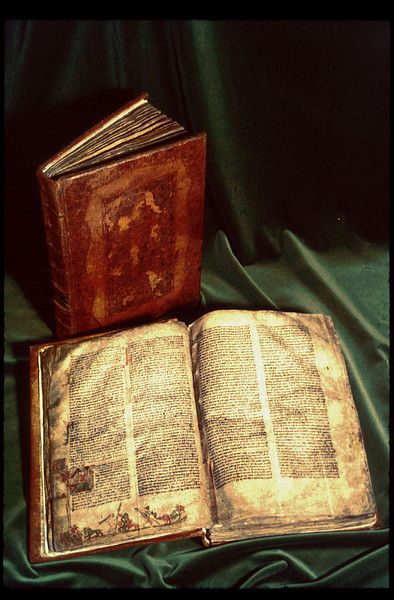
The poem Atlakviða contains the other mention of Ull in Eddic poetry. Gudrun, the former wife of the famous Sigurd the dragon-slayer from the heroic legend, gets infuriated with her husband Atli and reminds him of the oaths he has sworn: "it will follow you Atli / what you and Gunnar have / what you swore to each other / a long time ago / on the southern sun / on the victory-god’s mountain / on the wedding-bed / and on the ring of Ull" (Hildebrand, 678). The last oath, possibly the most solemn, was sworn on the ring of Ull, but the connection between the four pledges remains uncertain. Swearing on rings was commonplace throughout Scandinavia and Iceland, and certain place names such as Lilla Ullevi in Sweden where ring amulets have been discovered seem to point out into the direction of a cult of Ull. The presence of the sun and of Ull in this oath context of an archaic poem describing legendary events set in the 5th century further enforces the idea that this enigmatic god was celebrated before the Viking Age or at least before the poetic tradition. Interestingly, these very few and problematic references only point out a cultic aspect, as Ull has no storyline. He was probably a very antiquated figure at the time the poems were written.
Ull in the Prose Edda
For other pieces of evidence we can definitely query Snorri Sturluson’s Prose Edda, the textbook he devised for poets in a time mythological references were turning obscure. Although Ull is not part of any story in Snorri’s work either, the author seems to have had knowledge of some of his attributes. In Gylfaginning, the story about how king Gylfi travels to Asgard in disguise to learn about the gods, at some point one of the three dwellers in the hall makes a list of other noteworthy æsir (gods) where Ull stands next to last:
Ull is the name of one, son of Sif, stepson of Thor. He is such a good archer and skier that no one can compete with him. He is also beautiful in appearance and has the warrior’s accomplishments. He is a good one to pray to in single combat. (Snorri, tr. A. Faulkes, section 31, 26)
Later in the chapter Skáldskaparmál, on the poetic language, he is mentioned again but with few details: "How shall Ull be referred to? By calling him son of Sif, stepson of Thor, ski-As, bow-As, hunting-As, shield-As" (section 14, 76). The idea of Ull as an archer fits the other description we had in the Poetic Edda about the place of residence called "yew dales", yew being one of the finest trees to craft bows. However, it is difficult to make sense of this relationship between Ull as an archer and the yew tree, the latter preceding the former most likely since yew was not known in Iceland. If Ull had been rather popular in Sweden, his dwelling in a valley of yews would have been understandable, although troublesome for mythology enthusiasts nowadays. Some scholars have also suggested that Ull’s role as an archer could be deep-rooted, tied to the use of the Old English word wuldorgeflogene - "glory flown things" appearing from the skies as poison against which the poet uses wuldortanas, "glory twigs" - as wuldor is linked to the Gothic form of Ull, wulþus (North 1997, 244).
The explicit idea of Ull as a god on skis comes only from Snorri and could be a later development, possibly influenced by the habit of hunting with the bow and skiing. Interestingly, the goddess Skadi (Skaði), the pair of the fertility god Njörd, is given the same attributes by Snorri, making us about a potential connection or transfer of roles. Concerning Snorri’s claim about Ull’s beauty, we should not read too much into it as he does not limit it to this god only. Some scholars have proposed that the phrase used by Snorri, fagr alitum, "beautiful in appearance", reflects the Old English wlite, "brightness" or "radiance", often used in poetry as alliterative pair with wuldor/Ullr, so the god’s attribute of resplendent beauty might be an ancient one.
The same problem occurs when we look at the warrior metaphors. Besides, the name of the gods can be used interchangeably when poets describe warmongering. Snorri’s last remark in Gylfaginning refers to summoning him in a duel, as means for settling a dispute. This does not necessarily have to do with the other belligerent phrases - as war and duel were distinct concepts - but with a potential role of upholder of law and justice, as seen in the previous situation of invoking him when swearing an oath.
Saxo Grammaticus
Lastly, we have Saxo Grammaticus' history from the 12th century, where he integrated Norse myth including a story about Ull under the Latinized form Ollerus. The account tells of Othinus (Odin) who is banished from his kingdom in Byzantium because of his adultery in the attempt to produce a son to avenge Baldur’s death. Othinus names Ollerus in his place to be elevated to godhood, and after about ten years of reigning in his name, Ollerus himself is driven out of Byzantium to the land of the Swedes, where he ends up beaten to death by Danes as he tries to rise in the ranks. Ollerus seems to have been so skilled in sorcery that when he travelled he did so on a bone carved with magic spells. Saxo also alludes to the vague presence of Ull in Denmark, and an even vaguer memory of a royal god of Sweden. With a little imagination, we can think of the bone he travelled on as some sort of ship, which Snorri uses to denote a shield.
Place Names
As we have seen, the literary tradition allows for quite an amount of speculation and guesswork regarding the position of Ull in Norse mythology. What it is relatively safe to assume is that at some point he played a greater part in the stories than in the medieval scraps. On the other hand, Scandinavia is filled with probable theophoric (related to gods) place names that could involve ritual practice and a pagan cult. The scholarly consensus is that some of these probably refer to Ull, but others are disputed because of the meaning of the appellative rather than the god himself: a place of "splendour", not a place of Ull.
Sweden contains about 30-35 more or less certain place names featuring Ull (Ullr), mostly in the area inhabited by the tribe of the Svear, with some in the area of the Geats or far south in Gotland. Many names are formed by associating Ull with -vi (vé – shrine), variations of Ullevi. Other place names are formed with -aker ("field"), -tuna ("farmyard"), -lund ("grove") or -ö ("island"), usually old settlements and only a few parishes. Examples of place names potentially linked to Ull are Ullunda, Ullevi, Ullarvi, Ullne, Ulleåker, Ullerö, and Ultuna.
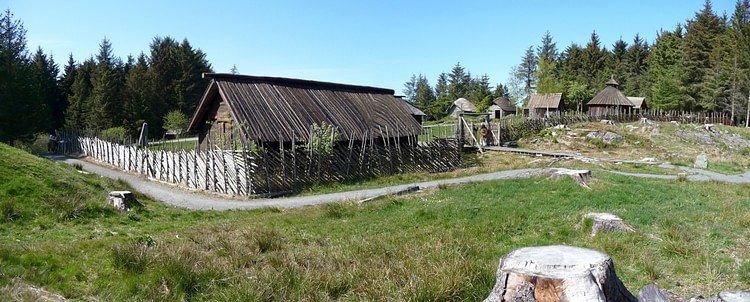
In Norway, the number of theophoric names is about the same and also rather to the south and centre. The bulk of names containing Ull are tied to -land, -vin ("meadow"), some to other natural landscapes -øy ("island"), -akr ("field"), -dalr ("valley"), -nes ("headland") or the more religious -hof ("temple"). Another feature of these places in Norway would be the presence of an alternative element, Ullinn, possibly a younger form that became popular once the Swedes and their cult of Ull gained more ground in eastern Norway. Examples of place names potentially linked to Ull are Ulleland, Ullin, Ullarin, Ulledalen, Ulleberg, Ullarvik, Ulleraal, and Ullevaal.
Despite this abundance of names calling attention to the long-lost archer god of oaths and his former dominance in the North, many of them might not refer to him at all, but instead to profane words denoting topographical features or traits of the surrounding landscapes. Many explanations for these names have been put forward, ranging from name developments such as ulfr/ulv ("wolf") to Ulle, up to wooly plant species, as ull (without the r at the end) is wool. Therefore, each place name has its own problematic discussion on the etymology and the extent of connection with the god Ull.
Iceland does not lack names beginning with Ullar- either, but these most probably refer to the actual wool, due to the high economic importance of sheep herding there. Moreover, it points out another tough spot when attempting to reveal Ull: distinguishing between ull and Ullr, as both nouns share the same suffix for the genitive singular (ullar). According to his description as a hunting god to invoke in duels, a connection between wool and Ull seems unlikely, and based on the textual evidence, the cult of Ull was also unlikely to be still active when the Norse colonised Iceland.

